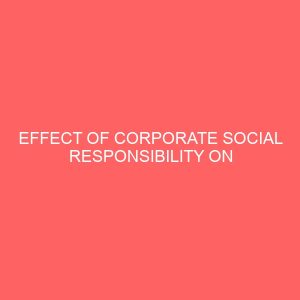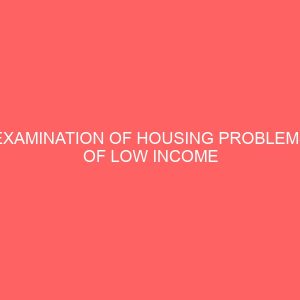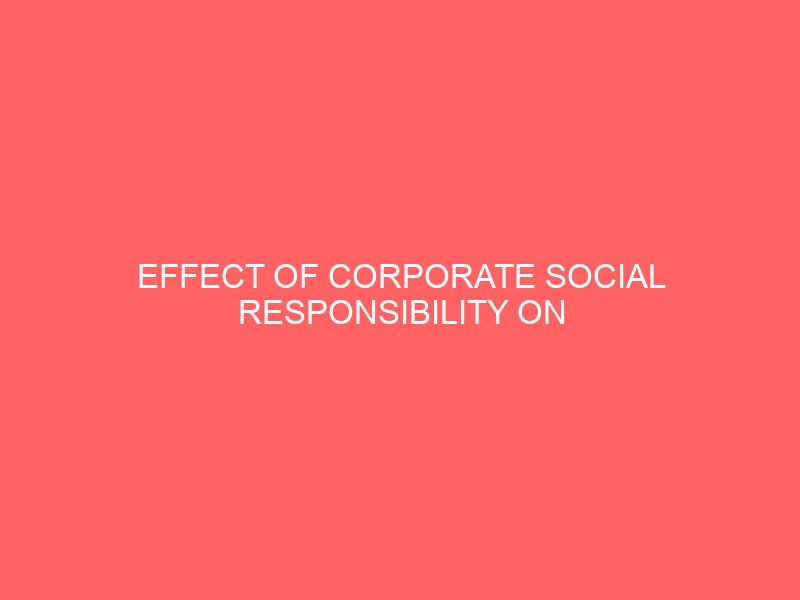Description
ABSTRACT
This study carried out an in depth analysis on how corporate social responsibility affects organization overall performance. The questions about who should benefit, when should it be implemented, what are the limitation and to what extent should the organization go in performing corporate social responsibility. Questions were developed to collect information on corporate social responsibility from Julius Berger Nigeria Limited and its historical background using the simple random sample method. Various authors views were discussed on corporate social responsibility and organization performance and the historical background of corporate social reasonability was also enumerated. For any organization to sustain its long term existence plan, corporate social responsibility is a prerequisite to be followed.
CHAPTER ONE
INTRODUCTION
1.1 BACKGROUND TO THE STUDY
The dictates of todays business environment is no doubt a good reason for business organization to strive for survival by efficiently using the factors of production and other facility of the society to attain its shareholders profit maximization goal without diverting from government regulations, ethical rules and the vast expectation from the society Yassin, 2005.
This process put organization in an inter dependent relation with the Government, the community at large and the business environment. Thus, prompting business managers and corporate organization to finding a proper equilibrium points between its original aim of establishment and its environmental demands.
Every organization with the view of maintaining a long term existence plan will not be narrowly responsible to just meet its shareholders goal but will satisfy its primary and secondary stakeholders interest. These stakeholders include the shareholders, Government, employee, its community, suppliers, customers, trade association among others. Williams, 2000.
Performance optimization is a major aim to every organization survival, being socially responsible to every stakeholder would be headway to such a fit. In a bid to find how organizational performance have affected via corporate social responsibility and acceptability, Julius Berger Nigeria Plc. has been chosen, as one of the Nigerian organizations that got into Nigeria time light in August 1965 when it got its first contract in Nigeria to construct the Eko Bridge, Lagos.
The historical background of corporate social responsibility and acceptability dated back to the first ever business crisis of 1870 which saw the evolution of corporate social responsibility and corporate acceptability coming from the aftermath of three business crises namely the 1870 crises, 1930 and the 1970 crises James, 1987.
Today the concept has received wide recognition from scholar around the world, consisting of those arguing for and those strongly against the teaching of corporate social responsibility and acceptability.
1.2 STATEMENT OF THE PROBLEM
For any organization to be fully socially responsible and accepted, there are some inevitable problems which varies from industry to industry and environment to environment while some are unilateral to all.
Amidst the problems faced at being socially responsible and accepted in the attempt to improve organizational performance, this research tends to answer the following problems.
- Capital cost of being socially responsible and accepted: Since being socially responsible is an expensive task compare to not being socially responsible in the short run. How do we encourage the organization to invest, participate and adopt social responsibility and acceptability.
2. Societal Differences: The expectations of society differs, hence, how do we measure the level of expenditure and acceptability of the organization social responsibility with that of the society.
3. Government Expectation: These are some policies on ground and new ones coming from the Government, hence, how do organization survive without organizations adjust or fit into these policies.
1.3 PURPOSE OF STUDY
The salient point of this study lies in its attempt to find organizations engaged in social responsibility and acceptability and find out how it affects them and to also,
- Enable organizations that have not introduced the social program into its organization policies, see the need to do so and to also expose them to the incomparable benefit in being socially responsible and accepted.
2. To enable researcher find out problems encountered in implementing social program into organizational program.
3. To help determine the effect of corporate social responsibility and acceptability on shareholders find.
4. To help determine the relationship between corporate social responsibility and economic growth.
5. To assist in knowing how social responsibility program affect organizational goal and objectives.
6. To highlight the various ways through which organization performance can be measured.
7. To assist new organization secure such advantageous development into their operation.
1.4 SIGNIFICANCE OF THE STUDY
The study exposes the following facts on how corporate social responsibility and acceptability affect organization performance.
- The study shows that the more socially responsible an organization is the better its relationship with community which will in turn increase its image and thereafter its sales volume.
2. It proves that internal social responsibility increases employees performance as they will have a sense of belonging through its motivational programs.
3. The study state that business strive positively under a well structured corporate social responsibility and acceptability.







Reviews
There are no reviews yet.